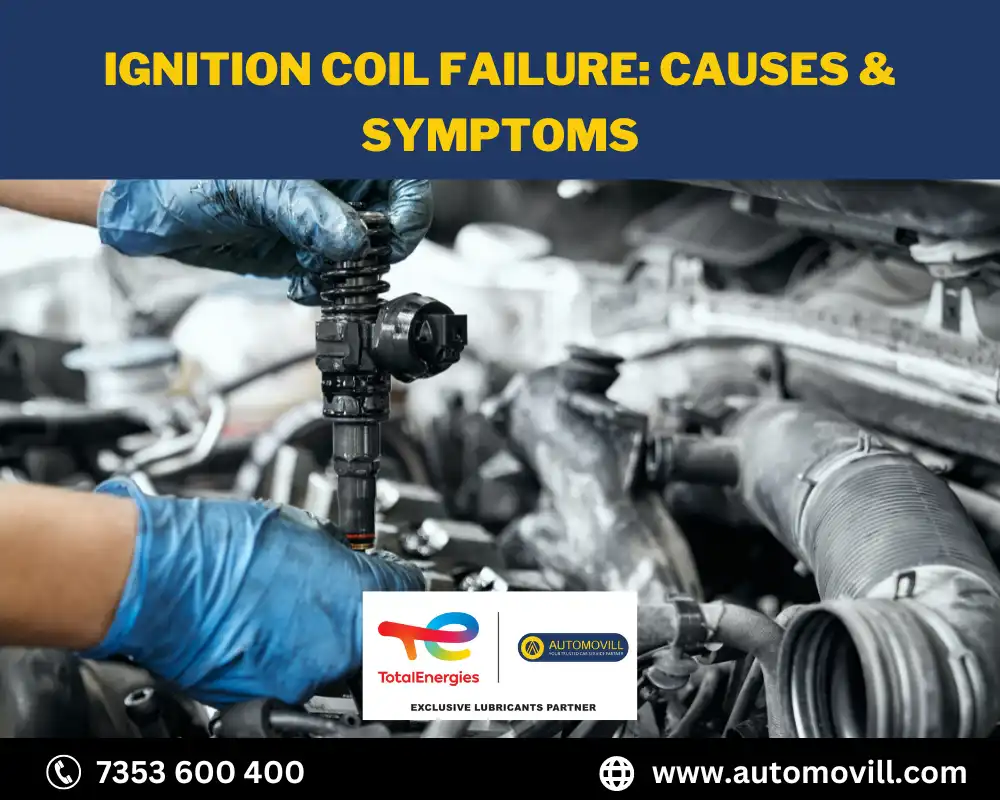
Imagine driving along a road, with family or friends in a happy mood and suddenly you start to notice that your vehicle starts to jerk and lose power. The culprit behind this frustrating experience could be an ignition coil failure.
Ignition coils play a crucial role in the combustion process of an internal combustion engine, and when they malfunction, it can lead to a range of issues.
In this blog, we will discuss the depths of ignition coil failure causes, exploring the underlying reasons behind this common automotive problem and the symptoms that can indicate the presence of a faulty ignition coil.
Causes Of Ignition Coil Failure
Here are:
1) Age and Wear
- Over time, ignition coils experience wear and tear due to constant exposure to high temperatures and electrical currents.
- Aging components can weaken the insulation, resulting in electrical leakage and reduced coil performance.
- Continuous exposure to vibrations and engine movements can also contribute to coil deterioration.
2) Voltage Surges
- Voltage surges caused by faulty electrical components or irregularities in the charging system can overload the ignition coil, leading to its failure.
- Excessive voltage can cause insulation breakdown and create short circuits within the coil, disrupting the flow of electricity.
3) Heat and Temperature Extremes
- High operating temperatures within the engine compartment can place immense stress on ignition coils, particularly during prolonged driving or in hot climates.
- Extreme temperature fluctuations, such as rapid heating and cooling cycles, can cause thermal expansion and contraction, eventually leading to coil failure.
4) Moisture and Corrosion
- Moisture intrusion, whether from external sources like rain or internal issues like coolant leaks, can cause corrosion and damage to the ignition coil.
- Corrosion weakens the coil’s connections, interrupting the flow of electricity and impeding its performance.
5) Manufacturing Defects
- Occasionally, manufacturing defects can lead to premature ignition coil failures.
- Flaws in the design, construction, or materials used in the coil’s manufacturing process may render it susceptible to failure.
Symptoms of Ignition Coil Failure
1) Engine Misfires
- One of the most common signs of ignition coil failure is engine misfires or stumbling during acceleration.
- You may experience a loss of power, rough idling, or a noticeable decrease in overall engine performance.
2) Rough Engine Idling
- A faulty ignition coil can cause the engine to run unevenly at idle.
- You may notice the engine vibrating excessively or producing erratic RPM fluctuations.
3) Difficulty Starting the Engine
- A failing ignition coil can lead to difficulty starting the engine, especially when the vehicle is cold.
- You may experience prolonged cranking, multiple attempts to start the engine, or intermittent starting issues.
4) Decreased Fuel Efficiency
- Ignition coil failure can result in incomplete combustion, leading to decreased fuel efficiency.
- If you notice a sudden drop in your vehicle’s fuel economy without any other apparent cause, it could be a sign of a faulty ignition coil.
5) Illuminated Check Engine Light
- A malfunctioning ignition coil can trigger the check engine light on your vehicle’s dashboard.
- If you notice the check engine light staying on or flashing intermittently, it is advisable to have your vehicle diagnosed by a professional.
Should We Replace the Coil if It Fails?
The decision to replace an ignition coil that has failed depends on various factors, including the severity of the failure and the overall condition of the vehicle. Here are some considerations:
Diagnostic Evaluation:
- When faced with ignition coil failure symptoms, it is important to have your vehicle diagnosed by a qualified mechanic.
- The mechanic will assess the extent of the coil failure and determine if it can be repaired or if replacement is necessary.
Severity of Failure:
- If the ignition coil has completely failed and is unable to provide any spark to the engine, replacement is typically the recommended course of action.
- If there is a partial failure or intermittent issues, the coil may be salvaged through repair or cleaning.
Replacement Cost and Availability:
- Assess the cost of a new ignition coil and its availability for your specific vehicle make and model.
- In some cases, after market options may offer a more affordable alternative without compromising on quality.
Conclusion
Ignition coil failure can disrupt the performance of your vehicle and leave you stranded at the most inconvenient times. By recognizing the various causes of ignition coil failure and understanding the symptoms associated with it, you can identify potential issues early on and seek professional assistance.
Remember, regular maintenance, awareness of driving conditions, and the use of high-quality replacement parts are key to keeping your ignition system running smoothly and your adventures on the road uninterrupted.
